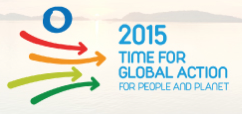A "food for thought paper" has been released regarding a possible Technology Facilitation Mechanism (TFM).
The inputs to the paper include the revised draft Addis Ababa Accord for the Third International Conference on Financing for Development (FfD3), which was released on 6 May 2015, and discussions during the joint meeting of the FfD3 and post-2015 negotiations on 22 April and the FfD3 intersessional discussions on 15 May 2015.
The proposals are also informed by the work of the Informal inter-agency working group (IAWG) on a technology facilitation mechanism.
 19 May 2015: A “food for thought paper” has been released regarding a possible Technology Facilitation Mechanism (TFM). The inputs to the paper include the revised draft Addis Ababa Accord for the Third International Conference on Financing for Development (FfD3), which was released on 6 May 2015, and discussions during the joint meeting of the FfD3 and post-2015 negotiations on 22 April, and the FfD3 intersessional discussions on 15 May 2015. The proposals are also informed by the work of the Informal inter-agency working group (IAWG) on a technology facilitation mechanism.
19 May 2015: A “food for thought paper” has been released regarding a possible Technology Facilitation Mechanism (TFM). The inputs to the paper include the revised draft Addis Ababa Accord for the Third International Conference on Financing for Development (FfD3), which was released on 6 May 2015, and discussions during the joint meeting of the FfD3 and post-2015 negotiations on 22 April, and the FfD3 intersessional discussions on 15 May 2015. The proposals are also informed by the work of the Informal inter-agency working group (IAWG) on a technology facilitation mechanism.
The paper notes that a TFM could “facilitate access to and exchange of information and knowledge to support the development, transfer, dissemination and diffusion of technologies for achieving the Sustainable Development Goals (SDGs), with a particular focus on technologies of benefit to the poor and vulnerable.” The paper outlines possible elements for a TFM according to four categories: online knowledge hub and information-sharing platform; annual (or biennial) forum on science, technology and innovation (STI) for the SDGs; UN system interagency working group on STI for the SDGs; and coordinated STI capacity building programme.
Based on the inputs, an online platform could entail, inter alia: mapping and bringing into one location information on existing TFMs, initiatives and programmes; sharing information, knowledge and experience; supporting “matchmaking” between technology supply and needs, including needs for technical assistance; and creating an online inventory of SDG-relevant technologies that are in the public domain.
A forum on STI could incorporate: the promotion of networking among governments, private sector, academics and others; the promotion of discussions on issues related to science and technology policy, innovation financing, technology cooperation and transfer; the facilitation of intergovernmental dialogue on the transfer and diffusion of publicly owned or funded technologies; and the review of innovative proposals for STI cooperation and for facilitating technology dissemination and transfer. The paper also notes the suggestion that such a forum could convene back-to-back with other international STI-related events, such as the Commission on Science and Technology for Development.
An interagency working group could coordinate UN system work for optimal efficiency of delivery and promote technology cooperation, and identify areas of synergy and cooperation and promote partnerships in support of the SDGs.
And a capacity building programme could: be built incrementally on existing programmes by the UN system, development banks, and international organizations; be in partnership with academic consortia, national R&D labs, and the business sector; provide special support for the least developed countries; support technology needs and gap assessments, and provide advice on available technologies; and support STI policy reviews for strengthening of national innovation ecosystems in developing countries.
The TFM is expected to be further discussed during the second week of informal, intersessional negotiations on the FfD3 outcome, which is scheduled to convene at UN Headquarters in New York, US, from 26-29 May 2015. [Food for Thought Paper on possible TFM][IISD RS Briefing note on the first intersessional meeting for FfD3][IISD RS coverage of the joint meeting of post-2015 and FfD3 negotiators]